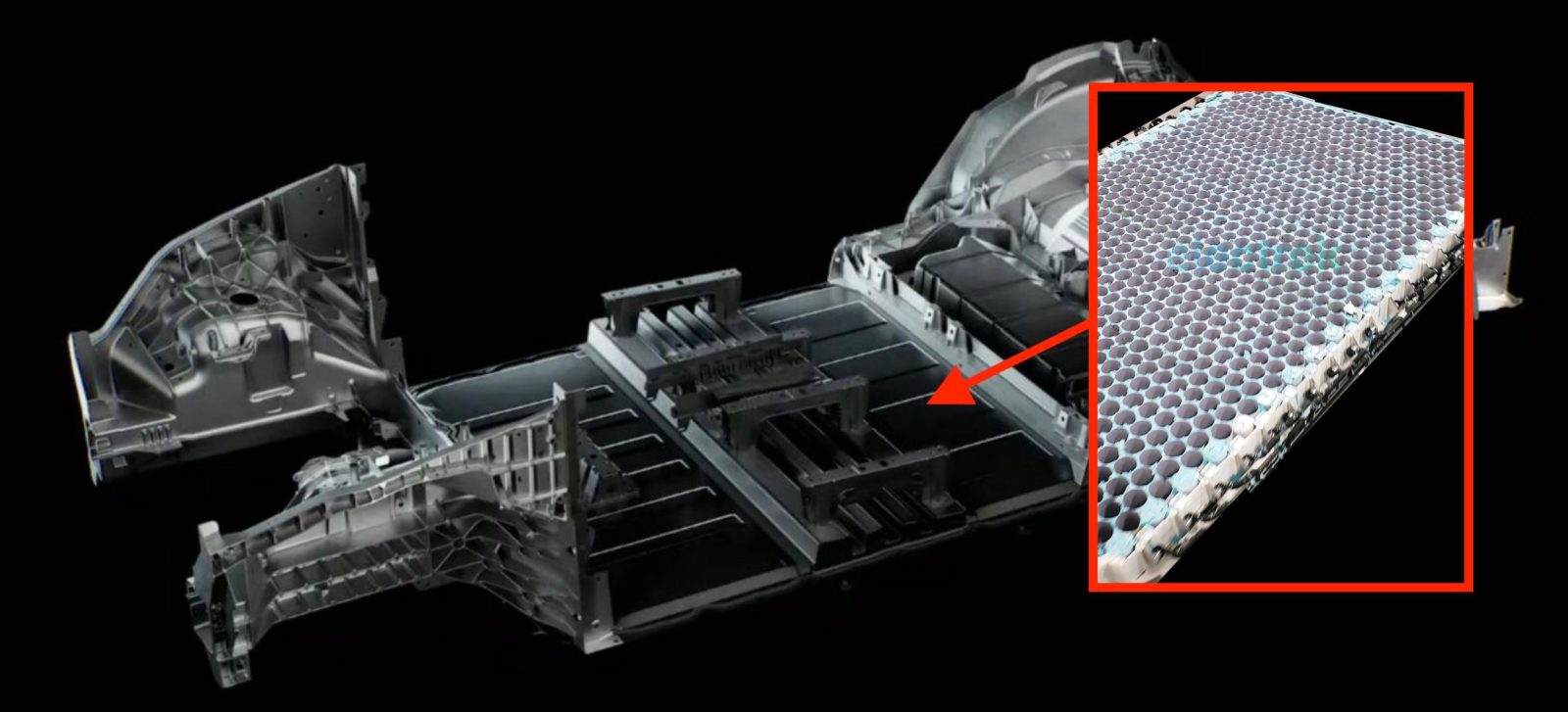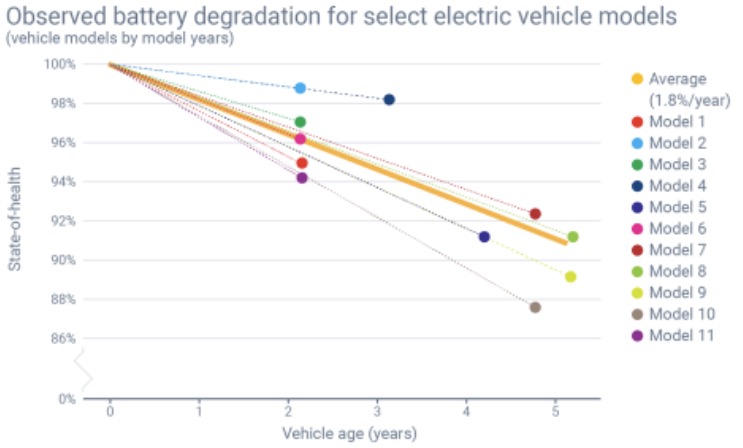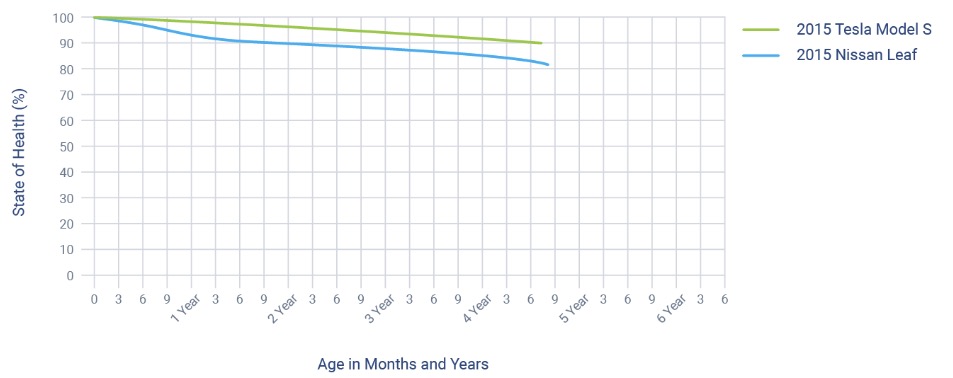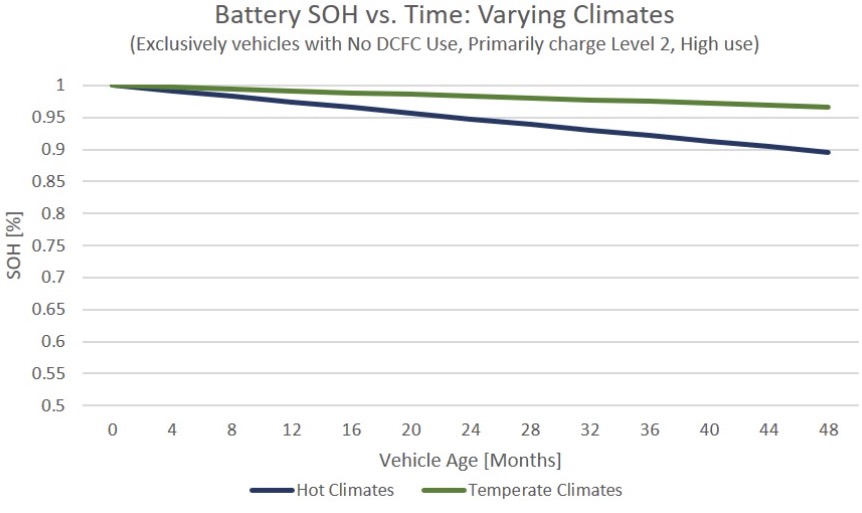
A new study of 10,000 electric cars shows that their battery packs should outlast the vehicles themselves.
Geotab, an automotive telematics company, is using its in-depth access to EV data to track battery health.
We reported on its last study in 2019, which showed 2.3% EV battery degradation per year.
5 years later, the company now has a lot more data, and it just released a new study that shows the average degradation per year is actually 1.8%. The company believes that it could translate to EV batteries lasting 20 years:
Geotab research shows that EV batteries could last 20 years or more if they degrade at an average rate of 1.8% per year, as we have observed.
Considering electric cars, like gasoline-powered vehicles, tend to break down for mechanical reasons much sooner than 20 years, the average vehicle lifespan is 15 years, this could mean that EV batteries should outlast their vehicles.
The company wrote in the study:
According to our data, the simple answer is that the vast majority of batteries will outlast the usable life of the vehicle and will never need to be replaced. If an average EV battery degrades at 1.8% per year, it will still have over 80% state of health after 12 years, generally beyond the usual life of a fleet vehicle.
However, Geotab does mention that more data would be needed as while there are quite a few high-mileage EVs out there, there are not many older EVs, and both time and mileage affect battery degradation.
Also, not all EVs are equal.
Without revealing the specific models, Geotab found significant differences in battery degradation between 11 different EV models:

The study does compare a few specific models, like a 2015 Tesla Model S and a 2015 Nissan Leaf, which is interesting in order to compare active temperature battery management, which the Leaf didn’t have back then.
The impact on battery degradation is clear:

Geotab’s study also dives into what environmental and usage factors impact battery degradation.
Frequent DC fast-charging and climates are mentioned. The former doesn’t have a massive impact, but using EVs in hot climates appears to have a more significant impact:

This highlights the need for EVs with great active cooling in hotter climates. Active cooling also helps reduce the impact of DC fast-charging at higher rate.
Geotab also mentions that EVs have different “battery buffers”, which is term used to refer to the battery capacity that is not used. This can affect known battery degradation as it can be adjusted with over-the-air software updates.
Electrek’s Take
Thanks to early battery degradation data, this has been suspected for a while, but I’m happy to see that it’s getting even better with more data.
Top comment by Philip234
The typical new ICE vehicle lasts 25 years unless they are lost to an accident. The average age of a vehicle on the road in the US today is over 12 years old (that is the average or mean age).
The rest of the study is basically statistical nonsense. It extrapolates a straight-line degradation (known to be incorrect) using early life data. The batteries will last much longer than 15 years and will not lose 30% in that time. They will last the same time as their ICE counterparts: over 20 years.
Now, while the battery might still be viable, I understand that some may be worried about excessive battery degradation resulting in shorter range.
That’s why automakers offer warranties against excessive battery degradation, which has been extremely rare so far. In my 10 years of reporting every day on electric cars, I can count on one hand the stories of EV owners reaching out about excessive degradation.
I think this reinforces the idea that battery-powered electric vehicles, combined with ethical sourcing of battery material, battery recycling, and renewable electricity production, is the way to go to make transportation sustainable long-term.
If you want to power your electric car with solar, there’s no better solar than your own. If you want to make sure you’re finding a trusted, reliable solar installer near you that offers competitive pricing, check out EnergySage. EnergySage is a free service that makes it easy for you to go solar – whether you’re a homeowner or renter. They have hundreds of pre-vetted solar installers competing for your business, ensuring you get high-quality solutions and save 20 to 30% compared to going it alone. Plus, it’s free to use and you won’t get sales calls until you select an installer and you share your phone number with them.
Your personalized solar quotes are easy to compare online and you’ll get access to unbiased Energy Advisors to help you every step of the way. Get started here.
FTC: We use income earning auto affiliate links. More.






Comments